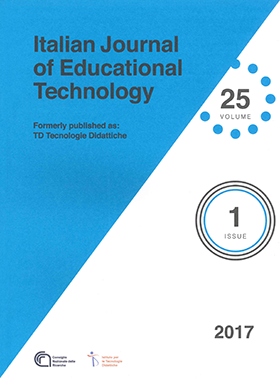Pedagogia critica e dati aperti come mezzi per educare alla coesione sociale
Contenuto principale dell'articolo
Abstract
Dettagli dell'articolo
Fascicolo
Sezione
Gli autori che pubblicano su questa rivista accettano le seguenti condizioni:
- Gli autori mantengono i diritti sulla loro opera e cedono alla rivista il diritto di prima pubblicazione dell'opera, contemporaneamente licenziata sotto una Licenza Creative Commons CC BY 4.0 Attribution 4.0 International License.
- Gli autori possono aderire ad altri accordi di licenza non esclusiva per la distribuzione della versione dell'opera pubblicata (es. depositarla in un archivio istituzionale o pubblicarla in una monografia), a patto di indicare che la prima pubblicazione è avvenuta su questa rivista.
- Gli autori possono diffondere la loro opera online (es. in repository istituzionali o nel loro sito web) prima e durante il processo di submission, poiché può portare a scambi produttivi e aumentare le citazioni dell'opera pubblicata (Vedi The effect of Open Access).
Riferimenti bibliografici
Atenas, J., Havemann, L., & Priego, E. (2015). Open Data as Open Educational Resources: Towards transversal skills and global citizenship. Open Praxis, 7(4), 377-389.
Barlett, L. (2015). Access and Quality of Education for International Migrant Children. Paper commissioned for the EFA Global Monitoring Report 2015, Education for All 2000-2015: achievements and challenges. UNESCO. Retrieved from http://unesdoc.unesco.org/images/0023/002324/232474e.pdf
Ciociola, C., & Reggi, L. (2015). A Scuola di OpenCoesione: From Open Data to Civic Engagement. In J. Atenas & L. Havemann (Eds.), Open Data as Open Educational Resources: Case Studies of Emerging Practice (pp. 26-38). London, UK: Open Knowledge, Open Education Working Group. Retrieved from http://education.okfn.org/files/2015/11/Book-Open-Data-as-Open-Educational-Resources1.pdf
Dietrich, D., Gray, J., McNamara, T., Poikola, A., Pollock, P., Tait, J., & Zijlstra, T. (2009). Open data handbook. Retrieved from http://opendatahandbook.org
Frank, A. V. (2000). Illness and Autobiographical Work: Dialogue as Narrative Destabilization. Qualitative Sociology, 23(1), 135-156.
Freire, P. (1970). Pedagogy of the Oppressed. New York, NY: Continuum.
Giroux, H. (2010). Rethinking Education as the Practice of Freedom: Paulo Freire and the Promise of Critical Pedagogy. Policy Futures in Education, 8(6), 715-721.
Jansen, J.D. (2009). Knowledge in the blood: confronting race and the apartheid past. Standford, CA: Stanford University Press.
Morin, E. (2002). Seven complex lessons in education for the future. Paris, France: UNESCO.
Open Knowledge International (2014). Global challenges. Retrieved from https://okfn.org/opendata/why-open-data/global-challenges/
Robinson, K., & Aronica, L. (2015). Creative Schools: The Grassroots Revolution That’s Transforming Education. New York, NY: Viking Penguin.
UNESCO (2015). Transversal Skills in TVET: Policy Implications. Asia-Pacific Education System Review Series No. 8. Retrieved from http://unesdoc.unesco.org/images/0023/002347/234738E.pdf
UNESCO (2016). Open Educational Resources. Retrieved from http://www.unesco.org/new/en/communication-and-information/access-to-knowledge/open-educational-resources/
World Bank (2014). Education in the Middle East and North Africa. Retrieved from http://www.worldbank.org/en/region/mena/brief/education-in-mena
Worsham, L. (2006). Composing (identity) in a posttraumatic age. In B.T. Williams (Ed.), Identity papers: Literacy and power in higher education (pp. 170–181). Logan, UT: Utah State University Press.
Zembylas, M. (2013). Critical Pedagogy and Emotion: Working Through ‘Troubled Knowledge’ in Posttraumatic Contexts. Critical Studies in Education, 54(2), 176-189. doi:10.1080/17508487.2012.743468

